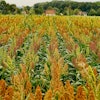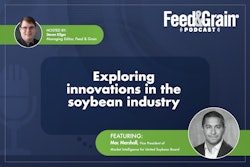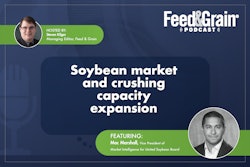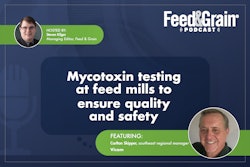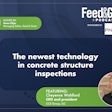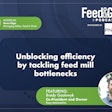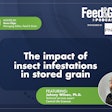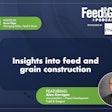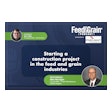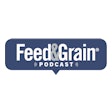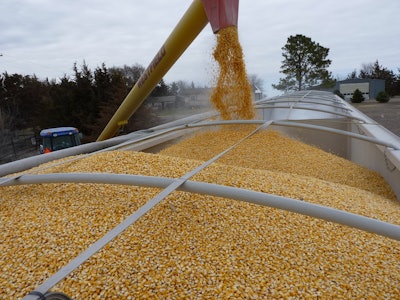
Steven Kilger, managing editor of Feed & Grain, welcomes Jeff Schreiner, CEO of Roger, and Jay Weber, product general manager for Roger, to talk about the world of grain handling and the growing significance of transparency in the industry. Roger, a digital business specializing in bulk freight trucking for agriculture, is at the forefront of digitizing grain logistics.
Join us for a discussion that looks at the origins of Roger, a neutral player facilitating better business practices for carriers, shippers and growers, and delves into customer demands that are driving the need for transparency and traceability throughout the supply chain, ultimately benefiting the industry's efficiency. The adoption of digital technologies, like Roger's app, is simplifying processes, from scale ticket management to real-time communication.
Transcript has been edited for clarity.
Steven Kilger: Hi everyone. My name is Steven Kilger, I’m the managing editor for Feed & Grain and the host of the Feed Grain Podcast. Thank you so much for joining me today as we dive deep into the issues impacting the feed manufacturing, grain handling and allied industries. Today Jeff Schreiner, CEO of Roger, returns to the podcast, alongside Jay Weber, project general manager for Roger.
Today, we're talking about the significance of transparency in grain handling, how digital technologies and data sharing enhance traceability, and what happened to Blockchain technology in the grain industry.
Before we start, if you’re listening to this in a podcasting app, please rate us and subscribe. If you’re listening online. sign up for the Feed & Grain newsletter, Industry Watch, to see the latest podcasts and stay up to date with all of the latest news from around the industry.
Now onto the show.
Kilger: Hi Jay and Jeff, thank you so much for joining me today.
Jay Weber: Hello.
Jeff Schreiner: Hey, Steven, good to be with you.
Kilger: Yeah, it's really exciting. Jeff, you've been on before (See: Top reasons to digitize grain shipments). And Jay, welcome to the podcast. Do you mind telling me and our listeners more about yourself and what you guys do with Roger?
Schreiner: Sure thing. Steven good to be back. The first one was fun. I'm excited to do this again. A little bit about Roger. Roger is a digital business that focuses on the bulk freight trucking side of agriculture and commodity movements. Our mission really is to convert what has been historically a very manual process to the modern way of doing digital business and create efficiency gains and better potential across the board. I've been doing this for quite a while. And that started back when I was a kid on the farm.
Weber: Good to be with you here today. I've been Roger for about a year and a half. Prior to that, I was actually in the chair of one of our customers. And I was a trader, I worked logistics. And that's really where the passion for doing what we're doing here at Roger came from seeing all the inefficiencies that our customers had. That's ultimately why I'm at Roger today.
Kilger: Yeah, Roger has a really fascinating backstory. I was first introduced to you two years ago at a National Grain and Feed Association (NGFA) Annual Meeting and you guys went through it all.
Schreiner: We're a neutral player in the market. We're not a shipper or a trucker. Our goal has always been to really be the facilitator of good business practices between the carriers and the shippers and drivers and what Jay's role was as a merchant. So that's been our mission in life for quite a while, have enjoyed playing that role. Because that's a sorely needed part of the market that hasn't existed for a long time.
Our history was, that we started really as an experiment to see if we could make it happen kind of in the Midwest. And it kind of blew up and became a nationwide business within a very short period of time. That little journey took us a few years to get all the way to the point where are right now. But it has been always that mission to serve that facilitator good business practices.
Kilger: You guys came together when you saw a need, it was you and some other people, wasn't it?
Schreiner: Yeah, we were started, really kind of as a byproduct of some big charter members that knew this problem existed. We were kind of the genesis of Cargill, Scoular, The Andersons, the Koch Ag and Energy Solutions, Bushel Technology Group and CGB. All of those groups were working toward the same end goal. And rather than having them all do something different, they decided to come together. Then we brought almost 500 carriers and asked them what their needs were, that was the whole genesis of Roger.
Kilger: Yes, big names to partner with right away. We have you on here to talk about transparency and grain handling and how that affects really the whole value chain. Can you talk about transparency? And how does it change the way the grain handling industry is run?
Schreiner: I'll start and Jay can really put this in the lens of the customer's experience. So transparency, when you talk about the digital world is actually proving where things move and where they came from. Where it started was, that the consumer's needs have changed over the course of time. Where you'd see a need on the shelf, you would see somebody asking more and more questions about where it came from how it had grown lately, and how were things treated.
The way that things worked before the digital era happened, it was very hard to get a real clear point of view on the supply chain. Transparency, as an initiative, was something that the customer asked for, which worked its way back all the way up through the supply chain, and eventually to your growers. That was the genesis of it all. Then Jay has taken the charge to look at this on the practical ways to get that done.
Weber: When you think about different markets in the industry, they're really defined by the customer. The customer is defining and saying they need this, and it's going to go on through the market to the supplier then eventually they need the technology or whatever it is to support that initiative. That's where Roger comes in. We're staying in front of this. As Jeff said, you're starting to see in the pet food industry, how people are asking for traceability. It also helps optimize the business quickly. So when there's a problem, the merchandiser, whoever's sitting in that chair can go and fix that problem quickly because of the traceability they have and the real time.
Kilger: Yeah, interesting, because I think agriculture in general kind of has this reputation of being a little behind, a little more delayed, in their uptake of technology. What makes it great is at this point, when you're starting to adopt these things, even like really simple changes can make a big difference to your business. Can you speak about what your technology does and how that is used to enhance data sharing and traceability for the process?
Schreiner: Let me give you a little bit on the technology front. A lot has changed over the 30 years since this phenomenon began. One -- almost everybody runs around with some piece of technology on them or in their pocket. When you are looking at how to get data, you can get all the way down to the person. What our technology does is use apps both on the phone and on the desktop that allow somebody to record events. That event starts as soon as somebody picks up some field grain or something out of the bin then traces that all the way back through the process.
We're recording data around those events. So their origins, we know where they are exactly to almost a three-foot mark, all the way through the destination. It's important because as it goes through the whole supply chain, exactly where things came from and exactly where they got dropped off with our technology is really simple. It's just it's just a simple app that you put on the phone that does these things behind the scenes, and people get the benefit of it.
Weber: I'll just add one thing on there. From a customer standpoint, Roger benefits the customer in a lot of different ways. One example is carrying a scale ticket. That's the biggest problem I had when I was a trader was getting a scale ticket shared between the driver and the carrier and the shipper and the receiver and doing it efficiently. Today, most of the time, it's mailed through the postal service. With Roger, it actually gets digitized. The driver takes a picture of it at scale, then digitally, it goes all the way to the shipper, in almost a matter of seconds. That is one example of where Roger is helping push the industry forward in digitizing.
Kilger: We all know that paper always comes with human mistakes. None of us are infallible, that the wait between -- well, let's get this ticket; let's have someone fill it out on the elevator and then we'll mail it to you. There are a lot of steps in there that mistakes can happen. Not to mention, just the wait makes it hard to make any kind of business decision. Maybe this isn't as big a deal, but I remember a few years ago, and all this talk about blockchain technology and how this was going to be the future. I thought you guys might be more the experts. I haven't heard as much about it lately.
There were a few companies that were using this blockchain technology to send grain shipments and, from what I understood, it was supposed to be the future of this kind of traceability technology. Do you have any thoughts about it? I think a lot of people are confused about what exactly blockchain is. How is it supposed to make things more transparent and more traceable with the grain handling industry?
Schreiner: I'll take this one and just give you a little bit of backstory. A new technology comes out about every 18 months, then, just like everything else, there are all kinds of realities about new technologies.
The genesis of blockchain was in the cryptocurrency market where I had an impenetrable ledger of events where cryptocurrency was pushed around. They use very secure technologies to ensure that nothing ever gets changed. The security of that data was almost bulletproof, because everybody had a copy of a common ledger. That's really what blockchain was: you submit a record and it creates an impenetrable record of what happened to that record over the course of time.
If we took blockchain and we put it into the space of commodity trading, you know, it's the same basic principle. They're trying to take records and give everybody who needs to know access to those records, so that you can prove something across the board from the time it was grown to the time it was delivered and how it was treated all along the way.
Blockchain was the standard bearer for that. The concept of a common data set, which is secured, is really not changed. Blockchain as a technology has a really good footprint, the way that it gets done in different applications, like agriculture, is achievable, whether you use the original blockchain technologies or you're just using the common language. You haven't heard about it a lot lately, mostly because I think its application has grown over the years. It's not necessarily the technology that matters, it's the solve that matters.
Kilger: See, that makes a lot more sense to me. The idea behind it just being a common record that everyone has makes it a lot clearer for me and probably every other layman out there, which is most of us.
Schreiner: It's really important, Steven, having that common data is a really important concept. Across all technologies, it's something to strive for. You just won't hear the technology buzz terms like that as much when applications become really deployable.
Kilger: That makes a lot of sense. One of the things that I love about companies like Roger and the digitizing of our industry is it helps to record the most important parts. Today, there's more and more that companies have to keep track of and there are more and more consequences. Now, if you're not keeping track of things, how do regulations in industry standards contribute to both the technology that you're developing and the traceability of the industry? It seems like a lot of this is FSMA and other regulations that are pushing the industry faster and faster toward this kind of traceability goal.
Weber: I think it's very big when you think of the NGFA and the trade rules that really drive our industry as well as USDA and some of the others. It's very important that Roger use them as a partner and work with them as new regulations come out, because they're going to need a way to support that. Most of those new regulations are going to be around technology. To be able to support the traceability we've talked about, we need to really look at them as a key partner and work with them to stay in front of that in order to support the things that they're bringing out.
Kilger: That's a really good point, because the industry is actually decent at regulating itself, like the arbitration system that NGFA has it is amazing that they've managed to convince all these different companies to follow this same system. It's not just federal regulations, it's just kind of industry best practices that need to be followed as well.
Weber: It drives everything from when the merchandiser or the farmer agrees on a contract, the terms of it, everything's driven off that from NGFA. So very important.
Kilger: What kind of challenges have arisen from implementing technologies like yours? Are you finding that people are pretty open to it? Is there a big learning curve? Especially when people are adopting your app in particular? What are the struggles there? And how are you overcoming them? You've all spent a lot of time making it possible for people to implement and make part of their workflow, but what are some of the struggles we're seeing?
Schreiner: Steven, and I'm going to start with holistically in the digital world, you've always got to worry about the security and privacy of that data. The threats, the risks and the vulnerabilities do change over the course of time, and you have to stay on top of all of that so you can keep the environment stable and people can use it with a high degree of trust. That is always a challenge, and it won't ever change. They will never change with something -- you have to accommodate, to make sure that you're doing all the right things there.
As far as adoption goes, things are changing. We don't see the same challenges we saw, even when we started, where people were just trying to understand if they wanted to use technology. We actually have the opposite of that now, where it's not only done they want to use it, they want to see the things that they like in the technology rapidly.
So our challenges are really from when we started, which was that at the beginning of the story, digitizing the whole freight market, to now, which is we've got customer demands that are specific and unique and industry-based. Our goal is to address those challenges and meet those demands. I think that's the biggest shift between years back when we started to today, which is the customer demands have grown. Our customers have gotten smarter, and they've gotten really skillful about how they're using the technology to do cool things. And we love it. You just have to keep on top of it.
Weber: To be honest, anytime you look at any change, it's tough. There's got to be an incentive behind it. Whether you're a shipper or a carrier or driver, there's got to be an incentive to change. They get there once you've talked to them. I mean, it's very simple. Most truck drivers have Facebook, if they can get on Facebook, they can handle Roger, really not that complicated. And we have simplified it as much as possible. We've got a couple of advisory boards we meet with one made up of shippers, one made up of carriers. We're really using that to drive the adoption of the app to be able to make it as simple as possible for those users.
Kilger: You're right. There's that stereotype of the old timer at the elevator who doesn't make any changes, but I don't think that's very true anymore. Number one, because, like every other industry, we're trying to get more and more of the new generation of kids coming out of college who have had a cell phone in their hands since they were 10. They know how they work. Also, just the efficiencies you gained from it, then the time saved from not having to do all that and written out paperwork, no more big poster boards with everything written down. It saves everyone time.
Schreiner: You know, Steven, you'd be surprised. You see 80-year-old folks that now are using technology to do almost everything. Even the folks who may have been resistant a few years back are questioning why we'd never do these things. I think even generationally, we've seen a big shift where it's just an expectation. It's probably going to be a very rare case where things aren't digitized in the near future.
Kilger: It's good for everyone in the industry, I think. It's like a wave -- once you start getting some of your processes digitized, you start to wonder, "Well, why isn't my entire facility completely automated?"
Schreiner: It's the same case in banking and retail, all that stuff has shifted. It's only natural to think that agriculture is going to have the same thing happen to it like it happened to all the other industries.
Kilger: This is the customer side of things. Number one, how are customers adapting to using your app? Do they like it? Who makes the first step? Is it usually the shippers? Or is it grain elevators that make the first move? And then how are they able to communicate with the others? What are the advantages of this? I know you have some stuff on your website, videos, things like that. How do you teach people how to use this?
Weber: I think to answer the first part of your question, early on, we saw the shippers as being the first adopters, followed by carriers. I think it's pretty split today. Carriers do see a big advantage and are able to even enter their own loads they get from nonshippers on Roger so they can manage their whole book of business, within Roger.
I think that's been a little bit of a surprising shift that we've seen just because of the benefits, they start to realize where they can invoice quicker, and they don't have to spend a weekend invoicing from a carrier standpoint. They can get paid quickly. I think once they got on and started seeing the benefits, the shipper and the carrier, the adoption has really taken off and gotten traction because there's a reason that they should be doing this.
Schreiner: As far as the speed and ease of getting on, it's pretty straightforward. It's just like any other app, you can download the Roger app. So if you're a carrier shipper and start using it right away, getting an account is just qualifying yourself. For somebody who's even marginally tech-savvy. It doesn't take much to get up and running. And then it's for even sophisticated, very complicated facilities or carrier groups. There are videos, and we provide different types of training, whether it's customized, or we just really do a deep dive into their organization to see what most makes sense. It runs the gamut to get started right away too, we want to really design around investments that they made and other technologies too. Yeah, great.
Kilger: Where do you see this industry going when it comes to traceability and transportation over the next couple of years?
Schreiner: A couple of things I would tell you that are almost a given. One is as more and this industry gets transformed, and digital business becomes the norm, you can just see how it gets translated into better decision-making. In the future, if someone gets to see historical trends and data as benchmarks, the chances of them making better, more profitable decisions are higher. So in the future, I think they'll just have that build-up base of all this intel they have on their organization allows them to ensure they get better.
I also think it's almost a given that you get some operational efficiency gains. Digital business takes things milliseconds compared to where we used to do, where we were doing data entry, and things like that. Those operational efficiency gains allow companies to actually look out and grow their network. Rather than just facilitating the business they have, when you digitize, you can get your network actually built out a lot wider. That is almost a natural, it's a given. It'll happen in our industry, just like every other industry.
Then I think for those that are really, really good and get really good at it, we're only scratching the surface on the art of the possibility of things that can are going to be in the future. I mean, you can look at what machine learning and AI is doing in other industries. Over the course of time, there's just absolutely no reason to think that we're not going to get some of those downstream benefits to and hopefully we're going to manage the goodness out of it and see the badness. That'll be up to people in the technology space like us. But I do think there are some distinct values that are going to happen. And I think with with Roger, our goal would be to not just keep pace, but see the future.
Weber: One other thing I'll add that we see coming forward and we're starting to see it today is the importance of integrations. Roger is able to integrate on the front end to a contract management system or on the back end to the accounting system. Whether it's a home-built system or it's one of the big players out there, we're able to integrate. That's important because anytime you take data out of a system, you compromise the integrity of that data, potentially because it's now manual entry by a person. Anytime you can tie the data across systems and keep that data pure, that's very important.
As far as what else is coming, I think we have these advisory boards. As I said, the market is going to tell us what we need to do. We're not going to go out there and assume that this big feature is going to solve everyone's problems. We need to be driven by the market just like a trader does, just like our customers do. We stay really close to our customers. We really listen to them to make sure we're going in the right direction. They're steering us.
Kilger: That's great. There are a lot of people that need to be fed. Anytime people can save time with the paperwork and get on to actually doing their jobs and feeding the world, the better. Right? Technology's going save us on that front. Thank you guys so much for joining me today. It is really fun to always have you guys on to talk about these kinds of issues affecting the grain and feed industry. I hope you guys come on again. It's been a blast!
Schreiner: It's been a pleasure. I certainly will. Thanks.
Kilger: Thank you so much for coming in. And thank you so much for listening. We'll talk to you next time. Bye.

